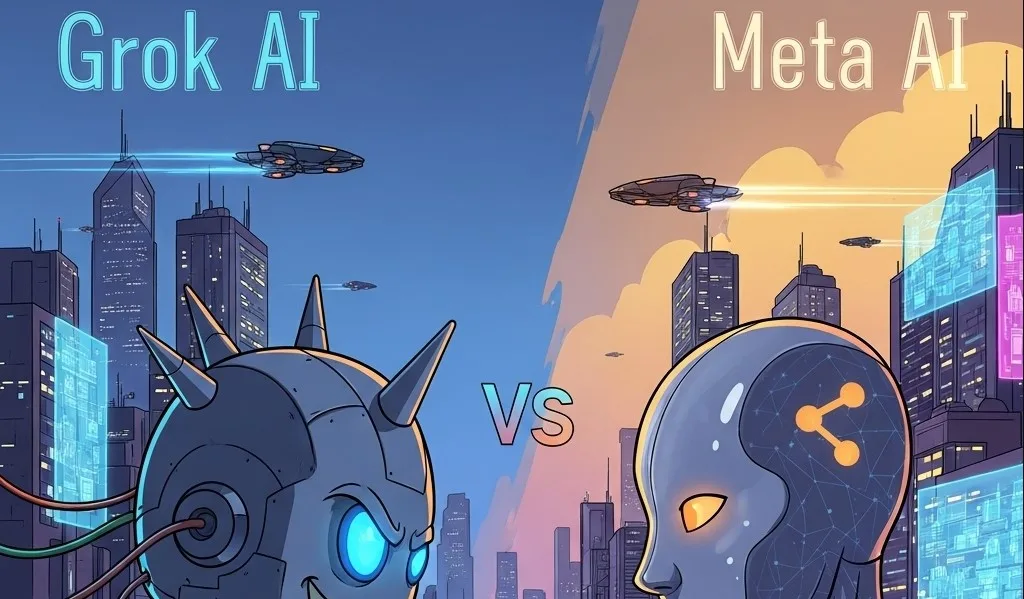Comparing Grok (developed by xAI) and Meta AI (powered by Llama) depends on your specific needs, as each has distinct strengths and weaknesses. Based on available information, here’s a breakdown to help you decide:
Grok’s Strengths
- Real-Time Data Access: Grok leverages real-time data from X, making it superior for up-to-date information, such as breaking news, trending topics, or current events. For example, it correctly provided the Houston Texans’ 5-1 win-loss record, while Meta AI was outdated at 4-1.
- Conversational Style: Grok is designed with a witty, humorous, and sometimes rebellious tone, which makes interactions more engaging for users who prefer a less formal AI. It’s described as having a “rebellious streak” and can tackle controversial topics other AIs might avoid.
- Reasoning and Coding: Grok 3 excels in reasoning, math, and coding tasks, achieving high scores like 93.3% on the 2025 AIME math competition and 79.4% on LiveCodeBench for coding. Its “Think” mode enhances problem-solving by refining strategies and correcting errors.
- Image Generation: Grok’s image generation is often more realistic and aligns better with artistic prompts, like lighting and mood, compared to Meta AI. For instance, it produced a better Texas flag image and a more atmospheric depiction of a man at a messy desk.
- X Integration: For users active on X, Grok’s ability to pull and analyze posts offers unique insights into trends and sentiment, making it ideal for social media-focused tasks.
Grok’s Weaknesses
- Limited Accessibility: Grok is primarily available to X Premium+ subscribers, which restricts its reach compared to Meta AI’s broader availability across Meta’s platforms (e.g., WhatsApp, Instagram).
- Third-Party Integration: Grok lacks the extensive plugin ecosystem of competitors like ChatGPT, limiting its seamless integration with productivity tools.
- Potential Bias: Its reliance on X data raises concerns about misinformation or bias, as social media platforms can amplify unverified content.
- Content Depth: For tasks like blog writing, Grok can produce overly literal or less comprehensive content, sometimes lacking the depth of a professional writer.
Meta AI’s Strengths
- Platform Integration: Meta AI is deeply integrated into Meta’s ecosystem (Facebook, Instagram, WhatsApp), making it highly accessible for casual users and content creators. It’s free, fast, and easy to use within these apps.
- Image Generation: Meta AI’s image generator is noted for speed and accuracy, often outperforming competitors like DALL-E 3. It excels in creating engaging visuals, though it may lack realism compared to Grok.
- Content Creation: Meta AI is strong in generating ready-to-use content, such as Instagram posts, blogs, or scripts, with clear instructions. It’s particularly effective for social media content creation.
- Common-Sense Queries: Meta AI is reliable for everyday tasks, like answering simple questions or providing recommendations (e.g., finding Italian restaurants). Its responses are quick, often within five seconds.
- Data Privacy Focus: Built with Meta’s privacy policies, Meta AI is designed to handle sensitive data securely, which is crucial for businesses in sectors like healthcare or finance.
Meta AI’s Weaknesses
- Real-Time Data: Meta AI lacks real-time data access, relying on static datasets, which can lead to outdated responses (e.g., incorrect sports records).
- Reasoning and Coding: While capable, Meta AI is slower and less accurate in coding tasks compared to Grok. For example, it took 9 seconds to generate Python code for prime numbers, but its output was less user-friendly than Grok’s cleaner code.
- Limited Multimodal Features: Meta AI doesn’t support image analysis in some regions (e.g., the UK) and lacks the advanced multimodal capabilities of competitors like Gemini or ChatGPT.
- Privacy Concerns: Despite its focus on privacy, Meta’s history of user data tracking raises ethical concerns about how AI improvements utilize personal information.
Head-to-Head Comparison
- Fact-Finding: Grok wins for real-time accuracy due to X integration, while Meta AI is better for static, general knowledge but may lag on current events.
- Image Generation: Meta AI is faster and more engaging for social media visuals, but Grok produces more realistic and artistic images.
- Coding: Grok’s cleaner, more accurate code output edges out Meta AI, though Meta AI is faster.
- Storytelling: Meta AI tends to produce more complete stories, while Grok’s are engaging but sometimes unfinished or overly “AI-like.”
- Social Media Tasks: Meta AI excels in creating platform-specific content (e.g., Instagram posts), while Grok is better for X-specific trend analysis.
- Accessibility and Cost: Meta AI is free and widely available, while Grok requires an X subscription, making Meta AI more accessible.
- Ethical Considerations: Grok’s minimal censorship raises misinformation risks, while Meta AI’s data privacy issues stem from Meta’s ecosystem.
User Sentiment on X
- Some users praise Grok for its reasoning, coding, and X integration, with one calling it “amazingly better” and effective for complex coding tasks.
- Others prefer Meta AI for its simplicity, speed, and free access, especially on WhatsApp, but criticize its performance compared to Gemini or Claude.
- A few dismiss Grok as a “meme LLM” or underperforming compared to ChatGPT, Gemini, or Claude, suggesting it’s not a top-tier choice for all use cases.
Verdict
- Choose Grok if you need real-time updates, strong reasoning for math or coding, or a witty, engaging AI for X-related tasks. It’s ideal for users active on X or those tackling technical problems.
- Choose Meta AI if you want a free, accessible tool for social media content creation, quick common-sense queries, or seamless integration with Meta’s platforms like WhatsApp or Instagram.
- Neither is Best Overall: For specific use cases like marketing or SEO, other AIs like Chatsonic may outperform both. For advanced coding or creative writing, ChatGPT or Claude might be better.
Ultimately, Grok edges out for real-time data and technical tasks, while Meta AI is better for accessibility and social media content. Your choice depends on whether you prioritize up-to-date insights and reasoning (Grok) or ease of use and content creation (Meta AI).

